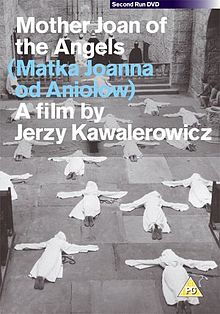- Mother Joan of the Angels
-
Mother Joan of the Angels 
Directed by Jerzy Kawalerowicz Starring - Lucyna Winnicka
- Mieczyslaw Voit
Release date(s) May 1961 (Cannes)
May 7, 1962 (United States)Running time 105 minutes Country Poland Language Polish Mother Joan of the Angels (Polish: Matka Joanna od Aniołów, also known as The Devil and the Nun) is a 1961 drama film on demonic possession, directed by Jerzy Kawalerowicz, based on a novella of the same title by Jarosław Iwaszkiewicz. The film won the Special Jury Prize at the 1961 Cannes Film Festival.[1]
Contents
Plot
Set in a seventeenth century Polish convent, the film begins as a priest, Father Suryn (Mieczyslaw Voit), arrives at a small inn for a night's rest. He has been sent to investigate a case of demonic possession at a nearby convent after a local priest was burnt for sexually tempting the nuns. The next day, he sets out for the convent, where he meets its abbess, Mother Joan (Lucyna Winnicka), said to be the most possessed of all the nuns. Father Suryn will have to go to hell and back to save Joan, casting himself forever into darkness for her salvation.
Cast
- Lucyna Winnicka as Mother Joan of the Angels
- Mieczyslaw Voit as Father Jozef Suryn / Rabbi
- Anna Ciepielewska as Sister Malgorzata
- Maria Chwalibóg as Antosia
- Kazimierz Fabisiak as Father Brym
- Stanislaw Jasiukiewicz as Chrzaszczewski
- Zygmunt Zintel as Wincenty Wolodkowicz
- Jerzy Kaczmarek as Kaziuk
- Franciszek Pieczka as Odryn
- Jaroslaw Kuszewski as Juraj
- Lech Wojciechowski as Piatkowski
- Marian Nosek as Dominican Priest
- Jerzy Walden as Dominican Priest
- Marian Nowak
- Zygmunt Malawski as Exorcist
Background
This film is very loosely based on the real life outbreak of mass hysteria in the French town of Loudun in 1634 that occurred when a convent of Ursuline nuns, led by the hunchbacked Sister Jeanne of the Angels, became obsessed with a handsome, womanising priest, Urbain Grandier. When Grandier turned down the nun's invitation to become their spiritual director, Jeanne, in a jealous rage, accused Grandier of using black magic to seduce her and her sisters and possess them with devils. Grandier's enemies, including Cardinal Richelieu, used the accusation as an excuse to have him found guilty of witchcraft and executed.
Unlike Ken Russell's The Devils (1971), which depicts Grandier's trial and death, Mother Joan of the Angels instead depicts the events after his death. The nuns continued to be possessed for four years after his death, and further exorcisms were carried out by the sincere and deeply spiritual Father Joseph Suryn whose main concern was helping Sister Jeanne.
Critical reception
The film was recommended by Philip Jenkinson[who?] in the Radio Times.
See also
- Cinema of Poland
- List of Polish-language films
References
- ^ "Festival de Cannes: Mother Joan of the Angels". festival-cannes.com. http://www.festival-cannes.com/en/archives/ficheFilm/id/3270/year/1961.html. Retrieved 2009-02-21.
External links
Awards Preceded by
Stars (1959)
No award 1960Special Jury Prize, Cannes
1961Succeeded by
The Trial of Joan of Arc
tied with L'EclisseFilms directed by Jerzy Kawalerowicz The Village Mill · Celuloza · Under the Phrygian Star · Shadow · The Real End of the Great War · Night Train · Mother Joan of the Angels · Pharaoh · Gra · Maddalena · Death of a President · Encounter on the Atlantic · The Inn · The Hostage of Europe · Bronstein's Children · Why? · Quo VadisCategories:- 1961 films
- Polish films
- Polish-language films
- 1960s drama films
- Black-and-white films
- Films directed by Jerzy Kawalerowicz
Wikimedia Foundation. 2010.
